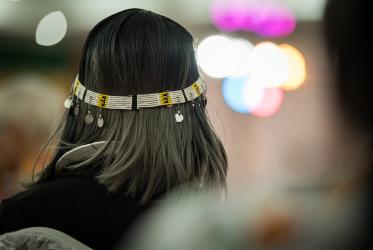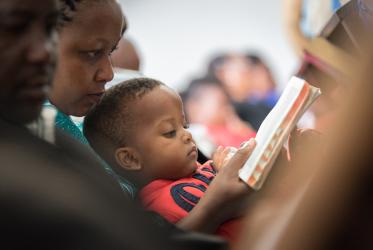*By Kristine Greenaway
What do indigenous peoples expect of churches in light of the report of Canada’s Truth and Reconciliation Commission (TRC) on church-run residential schools for aboriginal children? Perry Bellegarde, national chief of the Assembly of First Nations, responds in this interview with the World Council of Churches (WCC) Communication.
The TRC report on the impact of more than 100 years of residential schools includes 94 recommendations addressed to the country’s federal and provincial governments, churches and society at large. A number are related to concerns for child welfare, education, and health in indigenous communities.
Canada’s best-known aboriginal leader Perry Bellegarde is urging the country’s churches to take advantage of the current federal election campaign to press for measures to close the gap in the standard of living between Canada’s Indigenous and non-Indigenous communities.
“The gap is not good for the country. There is a high social cost,” says Bellegarde, national chief of the Assembly of First Nations (AFN), the advocacy organization representing Canada’s 900,000 aboriginal people.
Bellegarde is urging church members to ask candidates about their plans for improving schooling, health care, and housing in Indigenous communities.
The United Nations Human Development Index shows that economic and social development for Indigenous peoples – the country’s fastest growing population – is well below that of other Canadians. While Canada is ranked in the top 10 countries in the world overall, the same index places Indigenous communities at number 63 on the list. Substandard housing, poor schooling, inadequate medical service, racism and discrimination are key factors contributing to high rates of school dropouts, teen suicide, substance abuse, and violence among Canada’s aboriginal peoples.
Bellegarde, a member of the Little Black Bear First Nation, was elected to head the AFN in 2014. The long-time advocate for Indigenous rights is convinced that a radical reworking of Canada’s relations with its Indigenous peoples is urgent and he knows that won’t happen without allies like the churches.
“We need all Canadians – churches, advocacy groups and business councils,” he says. “This is an opportunity to rebuild the nation. We must restore relationships based on respect and create healthy communities.”
The final report of the TRC issued in June urges the Canadian government to implement the United Nations Declaration on Indigenous Peoples. Canada endorsed the declaration in November 2010 but has yet to enact it. Other TRC recommendations include calls to improve childcare in aboriginal communities, educate Canadians about government treaties granting land rights to First Nations people, teach Indigenous languages and traditions, and investigate the reasons behind the alarmingly high rate of unsolved cases of missing aboriginal girls and women. To-date, the federal government has not issued an implementation strategy for any of the TRC recommendations.
Indigenous leaders will be watching for proof of church involvement in pushing for implementation of strategies to improve the quality of life of aboriginal people. Benchmarks, according to Bellegarde, will include partnership relationships created between Christian faith communities and aboriginal communities, the number of letters sent to the prime minister in support of TRC recommendations and how many visits to provincial premiers have been initiated.
Bellegarde, who follows traditional Indigenous spiritual practices says, “There is one Creator. We are all connected: we are all part of the two-legged tribe. We are supposed to take decisions for seven generations down the road. Let’s leave them a world that is healthy and clean.”
This interview is the second in a three-part series of news articles featuring answers from a TRC Commissioner, the National Chief of the Assembly of First Nations, and a leading Indigenous Elder from The United Church of Canada.
* Kristine Greenaway is a former WCC communication director with extensive experience in covering stories about global and local ecumenism.
“Children are the heroes of the aboriginal residential schools story” (WCC feature article of 25 September 2015)








